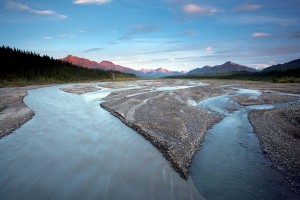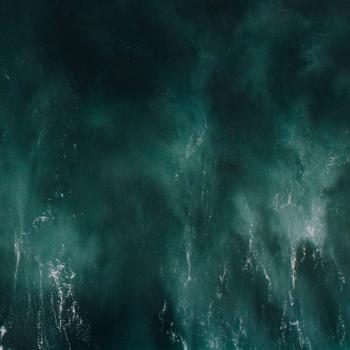 The last Father’s Day card I sent to my father came back to me, returned with the other personal effects recovered from the campsite he and my stepmother shared along an Arctic river.
The last Father’s Day card I sent to my father came back to me, returned with the other personal effects recovered from the campsite he and my stepmother shared along an Arctic river.
I’d talked to them on Father’s Day that year on a satellite phone when they called after dinner. I’d been sitting on the porch of my boyfriend’s house in Seattle, where we had just finished grilling salmon with his family. My dad and his wife sat in canvas chairs on the side of the Hulahula River in the Arctic National Wildlife Refuge, and recounted seeing wolves and sheep and aufeis. They shared a dehydrated meal of black beans for dinner, having the time of their lives.
A week later they were dead, killed by a grizzly that came into their campsite and attacked their tent.
I started looking for fathers then. It was not a conscious search, but a leaning in to older men who seemed to me a little bit funny, a little bit thoughtful, a little bit kind, a little bit wise. Men who might ask me a question about who I was, or how I was doing. To these men I asked one or two more questions than I might have. I looked at them a little longer around a dinner table.
I realized what I was doing when I glimpsed the limits to connection in their eyes. Small things reminded me that they were not my father, that I was asking too much, even secretly; small things that reminded me of my delusion that anyone might substitute for my father. I felt a twinge of misplaced betrayal. Then I had a jolt of loss again, the understanding that my dad would never be replaced, that I would, really, have to learn to live without him.
Still, a few men lingered as father figures. There was my dad’s best friend from the Army, who walked me down the aisle at my wedding. The man who ran social action at our church and whose daughter and I were the same age, whose grandson and my son were born a day apart. Dad’s best friend from Denali.
Not so secretly, I looked at these men for guidance, for support, and for love. This isn’t the strangest thing; we all shepherd those we know and love around us to some extent. It takes a village, and in many societies the responsibility is very real. By adopting these men as fathers, in one way or another, whether or not they were complicit, I had a broader, if possibly more superficial, sense of stability.
It wasn’t only that I realized that I was inventing new fathers foolishly, but something else blindsided me completely. There was the phone call that someone had been medevaced to the hospital for a stroke. The letter than someone had been in the hospital for weeks after complications from emergency surgery. The announcement that someone had succumbed to his fight with cancer that had never taken his faith or his cheer, but eventually took his life.
My secret adoptions had felt selfish, had been selfish, but they came at an unexpected cost. Opening my heart in new ways opened it to hurt, too. The gift of love is a weighty one. The further a heart opens, the more it can be again be broken.
A year after my final Father’s Day card came back to me, I went back to the same river. Of course I was looking for my father. I always am. I learned on that trip to keep moving forward, to keep putting my paddle in the water.
Boaters know that you can use a paddle not only to move forward, but also to stabilize yourself if the boat starts to tip. You put the paddle out flat against the surface of the water. It has the effect of pushing you back up.
Maybe what I was doing by looking to these men was just reaching out my paddle. Getting my balance. Maybe it was not superficial, but simply a more expansive understanding of love, a clearer acceptance of the community of saints on this side of the veil.
After my father died, I found his journal in the attic. His faith deepened, he said, after his father died, shortly after my mother filed for divorce. His father had called to talk to our family once a week. Instead of talking to his father, he found himself talking more to God. I have found myself praying, and then talking to my father, too.
There’s a danger here. Our fathers are not God, no matter how much we love them, no matter how much we miss them when we’re gone.
I wonder though, if the most we can hope for from our parents, the most we can hope to do as parents ourselves, is to be led and to lead our kids to look for God. We show our children that their search should look upward.
We love our children and teach them to love and to be loved. We teach them that as imperfect as is human love, as much as we may fail, God’s love is there in the gaps, around, above, below. God’s love comes before, and it is there after, and at all times in between. Even when life happens. Especially when life happens.
In reality there were limits to my own father’s love, as expansive as it was. Even someone bigger than life was still human.
I have spent some time reading and listening to lectures by Thomas Keating. Pick a word, he says, a word to focus on in contemplation.
My word is abba, father, or in its direct translation as I understand it: daddy.
My dad was as good a father as he could be to me. He taught me that I should learn to know and love Our Father.
Happy Father’s Day Dad. Thank you for leading me to my Father.
Shannon Huffman Polson’s final Father’s Day card is her memoir North of Hope: A Daughter’s Arctic Journey. She is a graduate of the SPU MFA program, mom to two wee ones, a novice gardener and an ex-Army helicopter pilot. She loves mountains, her family, and singing classical choral music.














